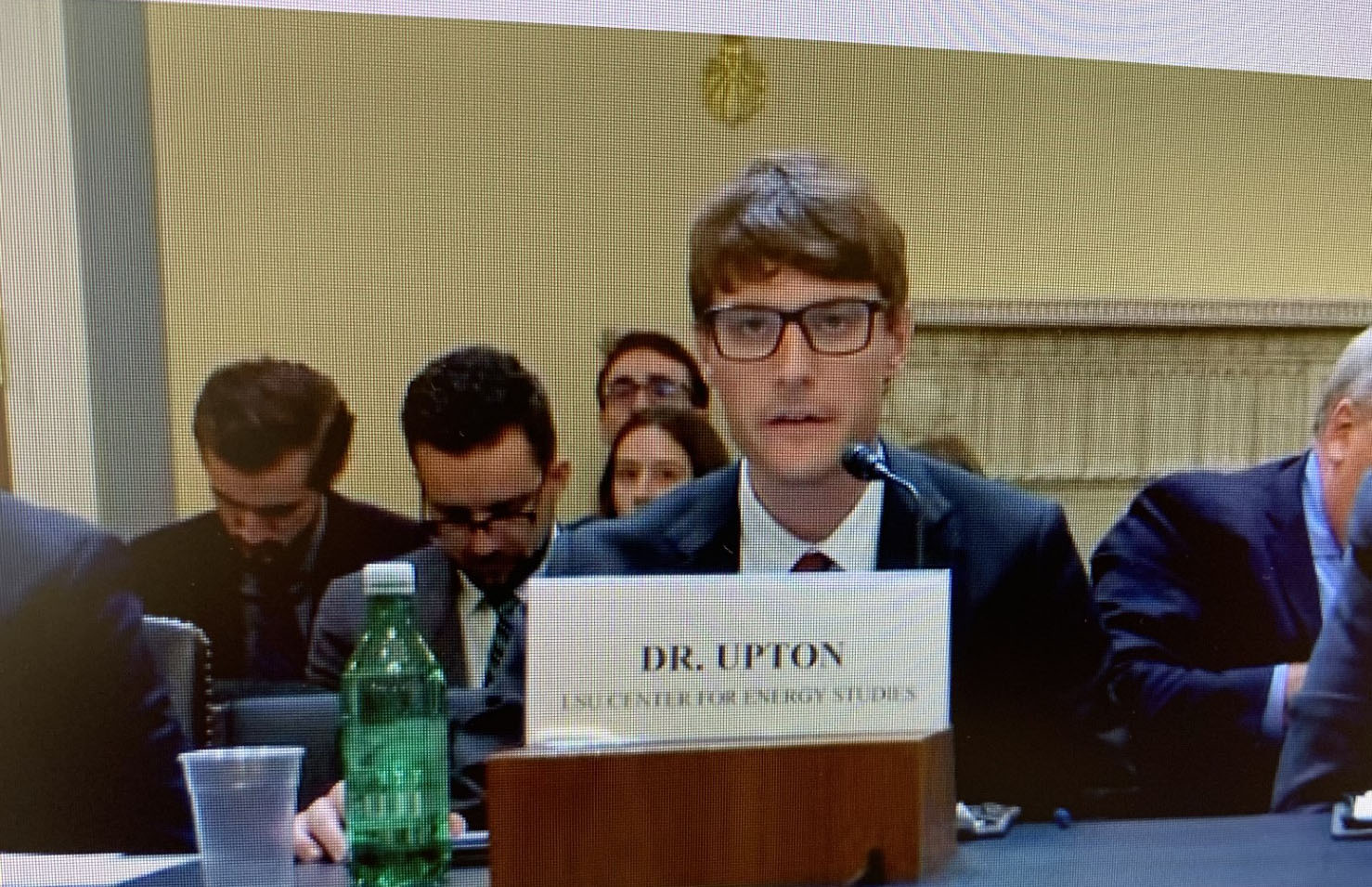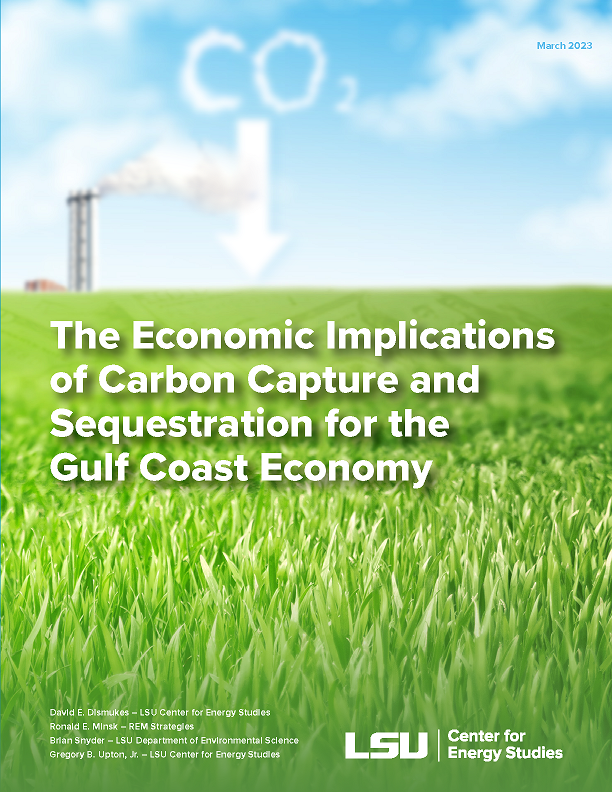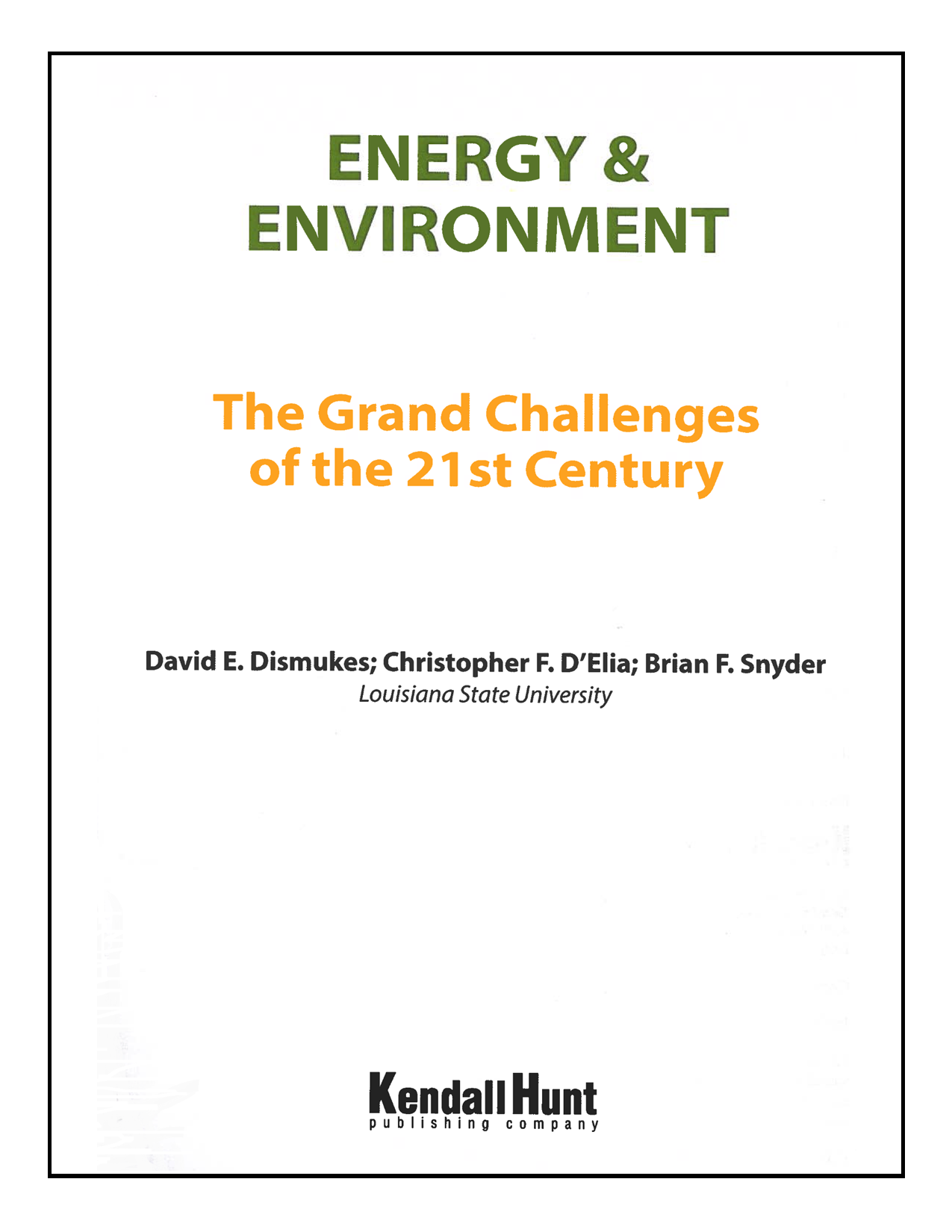2023 News
Posted November 15, 2023
 Center Releases 2024 Gulf Coast Energy Outlook
Center Releases 2024 Gulf Coast Energy Outlook
On November 15, 2023, the LSU Center for Energy Studies released the 2024 edition of the Gulf Coast Energy Outlook (GCEO) with a Zoom webinar presentation. As in previous years, this seventh edition of the GCEO provides a comprehensive overview of the Gulf Coast region’s energy industry outlook for the upcoming year. Center for Energy Studies Interim Executive Director Greg Upton, Professor Emeritus David E. Dismukes, and Research Fellow Gregory Albrecht authored the report.
This year’s edition focuses on whether a recession is still on the horizon; the risks and opportunities of Gulf Coast industrial decarbonization efforts; impacts of Russia’s invasion of Ukraine and resulting sanctions on global energy supply and demand; how federal supply-restrictive policies might impact companies and consumers; and the outlook for employment in oil and gas extraction and refining and chemicals in Louisiana and Texas.
Upton Testifies on Capitol Hill Regarding Offshore Lease Sales, Hydraulic Fracturing Bills
 Posted September 28, 2023
Posted September 28, 2023
BATON ROUGE – On Thursday, September 28, Center for Energy Studies (CES) Interim Executive
Director Greg Upton testified before the House Committee on Natural Resources Subcommittee
on Energy and Mineral Resources regarding two bills: HR 5616 by Rep. Garret Graves,
“BRIDGE Production Act of 2023,” requiring BOEM to conduct offshore lease sales, and
HR 1121 by Rep. Jeff Duncan, “Protecting American Energy Production Act,” that would
ensure that the federal government could not declare a moratorium on hydraulic fracturing
unless Congress were to authorize one.
Because both bills were drafted in response to potential federal policies to restrict
domestic oil and gas supply, in his testimony, requested by Subcommittee Chairman
Rep. Pete Stauber, Upton described Louisiana’s decarbonization efforts and the ways
in which federal policies to restrict the supply of fossil-based hydrocarbons, if
pursued, might impact those strategies.
Upton noted that U.S. energy demand has been relatively flat for the past decade,
a trend that is expected to continue. Also during the past 10 years, U.S. oil production
increased by 83 percent, natural gas production increased by 47 percent, and renewable
energy production increased by 51 percent. With domestic energy demand relatively
flat and domestic energy supply having increased, Upton said, this has attracted billions
of dollars of capital investment from all over the world aimed at processing and exporting
hydrocarbon-based products.
Most decarbonization pathways pursued by companies require the availability of fossil fuels: carbon capture, utilization and storage, hydrogen and ammonia production, electrification of industrial processes alongside emissions reductions on the power grid, utilizing bio-based feedstocks, as well as investments in the production of lower emissions sources of fossil-based hydrocarbons.
Upton said that policies aimed at reducing fossil fuel supply in the U.S. put these decarbonization strategies at risk, as investments in decarbonizing the industrial supply chain are likely to slow if firms anticipate reduced access to feedstocks.
Energy is central to LSU President William F. Tate IV’s #ScholarshipFirst Agenda. LSU’s expertise in this field has long been sought after by our nation’s leaders to guide policy and decision-making on matters related to this important sector of our nation’s economy.
Posted August 21, 2023
Louisiana Department of Natural Resources Awards LSU $3.2-million Methane Emissions Project
A new multi-year, $3.2 million multidisciplinary project funded by the Louisiana Department of Natural Resources will estimate oil field site restoration costs and methane emissions from orphaned and idle oil and gas wells in Louisiana. Led by principal investigators Greg Upton, interim executive director and associate professor, LSU Center for Energy Studies, and Kanchan Maiti, associate chair and professor, LSU Department of Oceanography & Coastal Sciences, the project aims to determine which wells in the state could potentially represent the best candidates for plugging and abandoning (P&Aing) based on their methane emission potential.
The impetus for the project is the prioritization of orphan well cleanup in the Infrastructure Investment and Jobs Act signed into law by President Joe Biden in November 2021. In January 2022, the Department of the Interior announced a formula for allocation across states of $1.15 billion to “create jobs cleaning up orphaned oil and gas wells.” Louisiana is eligible to receive an initial grant of $25 million and is estimated to be eligible for approximately $100 million in total funding in Phase 1.
“The Department of Energy (DOE) has asked states to provide input and documentation to help DOE determine allocations. Having rigorous analysis to back up a funding request can help Louisiana make a case for federal dollars to plug wells and clean up oilfield sites in the state,” said Upton.
According to a 2022 National Oceanic and Atmospheric Administration report, methane is the second-largest contributor to global warming after carbon dioxide and has had the largest percent increase in the atmosphere of any greenhouse gas since measurements began nearly 40 years ago. In 2019, methane emissions from abandoned oil and gas wells were included for the first time in national greenhouse gas inventories. Such wells can act as subsurface leakage pathways that connect oil and gas reservoirs to groundwater aquifers and the atmosphere.
Past studies have indicated that the top 10 percent of methane-emitting wells are responsible for 96 percent of cumulative methane emissions. The LSU project team aims to determine which wells in the state could potentially represent the best candidates for P&Aing based on their methane emission potential.
Co-Principal Investigators are Mark Agerton, assistant professor, Department of Agricultural and Resource Economics, University of California, Davis; Ipsita Gupta, associate professor, Craft & Hawks Department of Petroleum Engineering.
Posted August 16, 2023
Dept. of Energy Funds $4.9 Million LSU-led Direct Air Capture Hub Feasibility Study
BATON ROUGE -- The U.S. Department of Energy has awarded an LSU-led consortium a $4.9 million project to support the first phase of the Pelican Gulf Coast Carbon Removal project. The Pelican Consortium, which includes Shell and the University of Houston, will evaluate the feasibility of building a direct air capture (DAC) hub in Louisiana. DAC technologies capture CO2 directly from the atmosphere. The captured CO2 can then be used to manufacture products or be permanently stored in deep geological formations. As envisioned, the hub would enable accelerated and replicable carbon removal and permanent storage in ways that protect and generate jobs in the state.
LSU’s industry-leading partnerships epitomize the university’s commitment to working with global energy leaders to find new ways to fuel the nation – a core focus of LSU’s Scholarship First Agenda.
“Together with Shell, LSU is pioneering research and development pathways to protect and preserve Louisiana’s energy economy, while meeting the nation’s future energy needs,” said LSU President William F. Tate IV. “This joint platform has a direct industrial impact that can be felt nationwide in energy resilience and innovation, and LSU is proud of its role in connecting talent and research to protect our state’s energy economy.”
LSU and Shell will serve as a national model for energy-related project collaboration at the intersection of science and engineering, seizing the urgent opportunity for scholarship and solution delivery within the areas of hydrogen and carbon capture, utilization and storage (CCUS); the coast; and low carbon fuels.
“This funding will enable LSU to continue our energy focus on demonstration-scale projects that provide industry with the research, testing, and training capacity they need to lead energy transition for the nation,” said Robert Twilley, vice president of the LSU Office of Research & Economic Development. “LSU is poised to provide the research, development & demonstration (RD&D) of energy transition technologies that will provide communities with benefits while also improving our climate.”
The Pelican Consortium will evaluate the potential for scaling up and deploying multiple DAC technologies. These technologies will address some of the most challenging aspects of DAC: energy and water consumption and land use.
“This support of development and deployment of direct air capture technologies is a vital part of carbon management and allows us to explore sustainable technological and commercial opportunities,” said Ramanan Krishnamoorti, vice president for Energy and Innovation at the University of Houston. “UH is honored to be part of the Pelican Consortium and by fostering this collaboration with LSU and Shell, we will amplify the impact of this project across the Gulf Coast.”
“Shell is proud to work with LSU and the University of Houston as the technical delivery partner of Pelican Gulf Coast Carbon Removal,” said Adam Prince, general manager for Carbon Capture & Storage Strategy and Growth. “Advancing carbon management technologies is a critical part of the energy transition, and effectively scaling this technology will require continued collaboration, discipline, and innovation.”
“We’re excited to work with Shell and UH on this project,” said Greg Upton, LSU Center for Energy Studies interim executive director and associate professor-research. “Collaborative carbon removal research like this supports efforts to keep pace with the global movement toward a less carbon-intensive economy.”
The Pelican-Gulf Coast Carbon Removal project continues LSU’s research efforts in carbon capture, utilization and storage. Recent efforts include the following:
- In June, in response to numerous inquiries regarding the Inflation Reduction Act of 2022 and the 45Q tax credit, which incentivizes the use of carbon capture, utilization and storage, faculty from the Center for Energy Studies, the Department of Environmental Sciences, and the Cain Department of Chemical Engineering created a document titled, “What Is Carbon Capture, Utilization and Storage (CCUS)?” The document describes the nature of CO2, defines utilization and storage, identifies risks involved in the process, and explains why the Gulf Coast region is being considered for CCUS. The CCUS document was submitted as part of a comment by the Center for Energy Studies in response to the U.S. Environmental Protection Agency’s proposal to grant the State of Louisiana’s request for primary responsibility – or primacy – of Class VI wells under the Underground Injection Control Program, which regulates the injection of carbon dioxide into deep rock formation.
- In March, faculty from the Center for Energy Studies and the Department of Environmental Sciences published a report that estimates that a planned carbon capture and sequestration hub to be located in Calcasieu Parish, La., could abate climate damage, support jobs and workers, and protect the energy industry by capturing industrial carbon emissions and storing carbon dioxide permanently underground. The report, prepared for Gulf Coast Sequestration, estimates the regional and national economic implications of GCS’s planned carbon capture and sequestration hub.
- Every fall, the Center for Energy Studies publishes the Gulf Coast Energy Outlook. The central theme of the 2023 Outlook is implications of decarbonization for Louisiana and the regional economy. The report finds that decarbonization policies will challenge existing Gulf Coast energy manufacturing but also create opportunities for the region to take the lead in developing low- and net-zero emissions products. Over the forecast horizon, decarbonization is predicted to create considerable regional capital investment opportunities.
Posted July 19, 2023
Energy Transition Research Symposium Call for Papers
 The LSU Center for Energy Studies will host the inaugural Energy Transition Research
Symposium on Friday, October 6, 2023, at the Energy, Coast & Environment Building.
Sponsored by the Louisiana Board of Regents, the event will bring together energy
researchers from across the state and across disciplines. Researchers are invited
to submit an abstract or full working paper to be included in the program. Visit the symposium page for submission details. The deadline for submissions is August 18, 2023.
The LSU Center for Energy Studies will host the inaugural Energy Transition Research
Symposium on Friday, October 6, 2023, at the Energy, Coast & Environment Building.
Sponsored by the Louisiana Board of Regents, the event will bring together energy
researchers from across the state and across disciplines. Researchers are invited
to submit an abstract or full working paper to be included in the program. Visit the symposium page for submission details. The deadline for submissions is August 18, 2023.
Participating organizations include the Louisiana Department of Natural Resources, Louisiana Legislative Auditor, Louisiana State University, Louisiana Tech University, McNeese State University, Southern University, University of Louisiana at Lafayette, Tulane University, and University of New Orleans.
Representatives from all academic disciplines are welcome and encouraged to attend. Government and industry, as well as out-of-state researchers whose work focuses on Louisiana energy issues, are also invited to participate. Topics will range from oil and gas extraction, power generation, to the processing of hydrocarbons into liquid fuels, plastics, chemicals, fertilizers and more.
“With the energy sector as the cornerstone of Louisiana’s economy, the state’s universities employ faculty dedicated to energy research,” said Greg Upton, Center for Energy Studies interim executive director and associate professor. “We’re hoping that this symposium will provide an opportunity for them to share their expertise and possibly collaborate on future research.”
The event is free of charge, but registration is required.
Posted June 8, 2023
What is Carbon Capture, Utilization and Storage? LSU Faculty Explain
In response to numerous inquiries regarding the Inflation Reduction Act of 2022 and the 45Q tax credit, which incentivizes the use of carbon capture, utilization and storage, LSU faculty have collaborated on a brief document that describes the nature of CO2, defines utilization and storage, identifies risks involved in the process, and explains why the Gulf Coast region is being considered for CCUS.
Authors of the report are Greg Upton, interim executive director and associate professor, LSU Center for Energy Studies, Brian Snyder, associate professor, LSU Department of Environmental Sciences, and John Flake, professor, LSU Cain Department of Chemical Engineering.
The CCUS informational document has been submitted as part of a comment by the Center for Energy Studies in response to the U.S. Environmental Protection Agency’s proposal to grant the State of Louisiana’s request for primary responsibility – or primacy – of Class VI wells under the Underground Injection Control Program, which regulates the injection of carbon dioxide into deep rock formation.
Posted May 17, 2023
Dismukes Named IER Distinguished Fellow, Senior Economist
The Institute for Energy Research (IER) has named David Dismukes, Center for Energy Studies professor emeritus and former executive director, as Distinguished Fellow and Senior Economist.
“David has had a distinguished career in academia having led the Center for Energy Studies at LSU,” said Thomas Pyle, IER president. “His expertise will contribute greatly to the policy discussion here in Washington on a more permanent basis.”
Dismukes is a noted expert the analysis of economic, statistical, and public policy issues in energy and regulated industries. He has worked in consulting, academia, and government service and given more than 200 energy-related presentations to civic, professional, and trade organizations. His opinions on energy industry trends and issues have been quoted in the Wall Street Journal, the Washington Post, the New York Times, the Christian Science Monitor, the Los Angeles Times, and USA Today, as well as a host of other regional and local newspapers and trade newsletters.
“I am happy to be expanding my relationship with IER and excited to contribute to their important work explaining how competitive markets facilitate smart energy resource choices and consumer sovereignty,” Dismukes said.
Founded in 1989, the IER is a not-for-profit organization that conducts research and analysis on the functions, operations, and government regulation of global energy markets.
Posted May 17, 2023
La. Legislature Commends Center for Energy Studies on 40 years of Service
The Louisiana House of Representatives has commended the Center for Energy Studies at Louisiana State University for its 40 years of service to the state. House Resolution 42, submitted by Representative Jean-Paul Coussan, notes the creation of the Center in 1982 by the Louisiana Legislature. Housed at LSU since its inception, the Center “has for 40 years fulfilled its mission of providing energy information and analysis that responds to the needs of the legislature, public agencies, and business and civic groups.”
"As a proud resident of Lafayette and a staunch advocate for Louisiana's energy industry, I am thrilled to extend my sincerest congratulations to the Louisiana State University Center for Energy Studies on their remarkable 40 years of service,” said Coussan. “CES has played an integral role in shaping the energy landscape of our state and beyond, providing cutting-edge research, expert analysis, and invaluable guidance to policymakers, businesses, and communities alike. I am honored to recognize the Center's significant contributions to Louisiana's economy, energy security, and overall well-being, and look forward to their continued success in the years ahead."
The resolution, which calls for continued support of the Center and its mission, notes the Center’s prolific publication and service record—more than 700 publications, 150 public events, and 400 hundred media references and quotes on timely energy topics.
“Dr. Greg Upton and the Center for Energy Studies have been a tremendously helpful resource to the state of Louisiana, and I always appreciated their unbiased and thoughtful research and analysis,” said retired legislative fiscal officer Chris Keaton.
Speaker of the House Clay Schexnayder signed the resolution, which was then submitted to the Secretary of State in accordance with house rules. It was then sent to the Office of the President of LSU and members of the Board of Supervisors.
“We are very happy to commend the Center for Energy Studies for its decades of work on state energy issues,” said Rep. Ryan Bourriaque. “Louisiana is an energy-intensive state, so the Center is a valuable asset to not only the Legislature and state agencies, but to all of our constituents.”
Posted May 15, 2023
Job Opportunity at Center for Energy Studies
The Center for Energy Studies seeks applicants for the position of Research Associate 1, 2, or 3. The RA will assist with data cleaning, maintenance, and updating of CES energy-related databases and spreadsheets; use software to create, edit, and analyze shapefiles and geodatabases; work collaboratively with other research members by conducting literature reviews, collecting and validating data, and performing analysis at the direction of faculty; and assist with Center outreach.
Posted May 8, 2023
$30 billion estimated cost to plug and abandon inactive Gulf of Mexico oil and gas wells
BATON ROUGE – A forthcoming paper in the journal Nature Energy estimates that the
cost to plug and abandon the 14,000 unplugged, non-producing oil and gas wells in
U.S. Gulf of Mexico offshore waters, inland waters, and wetlands is $30 billion. Wells
closer to shore, in shallower waters, make up 90 percent of inactive wells but account
for only 25 percent of the total cost to plug and abandon.
When a well is no longer economically producing oil or natural gas, regulations require operators to place cement plugs in the wellbore and the upper portion of the well, thus preventing hydrocarbons and other forms of environmental pollution from leaking from the well, and underground saltwater from polluting fresh groundwater reservoirs.
Prior owners of wells in federal waters (deeper and farther from shore) can be held liable for plugging and abandoning costs if the current owner does not plug and abandon them. The authors find that 88 percent of the outstanding liability for plugging and abandoning wells in federal waters is associated with wells currently or formerly owned by at least one of the large “supermajor” companies.
The authors’ findings could inform states’ policy decisions. “The Infrastructure Investment and Jobs Act has authorized $4.7 billion for methane reduction programs, including cleanup of old oil and gas wells,” said report co-author Greg Upton, interim executive director and associate professor - research at the Center for Energy Studies. “States have a pretty good idea of what it costs to plug wells on land, but there is a lot of uncertainty as to what the costs were for these offshore wells.”
Coauthors with Upton are Mark Agerton, assistant professor, agricultural and resource economics, University of California, Davis; Brian Snyder, associate professor, LSU Department of Environmental Sciences; and Siddhartha Narra, research associate, LSU Center for Energy Studies.
Read the paper. (Subscription required.)
Posted March 20, 2023
 A new report from LSU’s Center for Energy Studies estimates that a planned carbon
capture and sequestration hub to be located in Calcasieu Parish could abate climate
damage, support jobs and workers, and protect the energy industry by capturing industrial
carbon emissions and storing carbon dioxide permanently underground.
A new report from LSU’s Center for Energy Studies estimates that a planned carbon
capture and sequestration hub to be located in Calcasieu Parish could abate climate
damage, support jobs and workers, and protect the energy industry by capturing industrial
carbon emissions and storing carbon dioxide permanently underground.
The report, prepared for Gulf Coast Sequestration, estimates the regional and national
economic implications of GCS’s planned carbon capture and sequestration hub. Produced
in partnership with GCS, the report is authored by David Dismukes, professor emeritus,
LSU Center for Energy Studies; Greg Upton, interim executive director, LSU Center
for Energy Studies; Ron Minsk, an energy and environmental policy consultant who served
as a special assistant to President Obama for Energy and Environment and special assistant
to President Clinton for Economic Policy; and Brian Snyder, associate professor, LSU
Department of Environmental Sciences.
GCS plans to build the first hub in the United States to permanently store carbon
dioxide emissions. Its target market is large industrial facilities looking to reduce
their lifecycle greenhouse gas emissions to preserve the economic competitiveness
of the region.
The planned GCS hub is located in Calcasieu Parish, near an important industrial corridor
that includes some of the largest fuel and petrochemical manufacturers in the U.S.
The report notes that these processes create “hard-to-abate” emissions for which carbon
capture and storage “offers a clear pathway to an improved carbon footprint, which
can allow such activities to continue and thrive in a low-carbon environment.”
“Under current technologies, this is a realistic pathway for the region to achieve
rapid decarbonization over the next decade,” Upton said.
“At GCS, we are committed to thorough research, including conducting hundreds of models
and simulation exercises to examine how our project will impact our environment and
our community,” said Gray Stream, CEO of GCS. “This report is another aspect of that
research, and we are pleased to have worked with LSU to analyze the project from an
economic perspective. The GCS hub represents a forward-looking opportunity to help
to grow and sustain American industry and jobs, while also ensuring environmental
protection now and in the future.”
The study found that the GCS project could have the following economic impacts:
- The potential to abate climate damages by $11.3 billion over the lifetime of the project (utilizing EPA’s social cost of CO2) by sequestering a total of 300 million tons of CO2.
- An estimated contribution of $698 million in earnings for U.S. workers during the anticipated five-year construction period, with approximately $560 million of this occurring in Louisiana and Texas.
- Support for more than 1,149 jobs nationally during construction, with more than 970 of these jobs in Louisiana and Texas.
- Support for approximately 375 jobs nationally once the project is completed, paying $21 million in earnings annually.
- Assistance in the decarbonization of - and thus protection of - an industry that employs approximately 150,000 workers directly in Texas and Louisiana alone.
The report explains that the benefits of decarbonization are at least two-fold: First,
decarbonizing makes current jobs in these sectors potentially more resilient in a
lower carbon future; and second, a reduced carbon intensity is increasingly becoming
an important factor as companies are considering siting in the Gulf Coast or other
regions.
The report states that successful decarbonization can “create a competitive advantage
for the region, which can continue to export products such as liquid fuels, chemicals,
fertilizers, and plastics globally. These products do not currently have viable substitutes.”
GCS has submitted two applications for Class VI Underground Injection Control permits
from the U.S. Environmental Protection Agency (EPA) and is prepared to move forward
to construction once permits are received.
Read the report.
Contact Marybeth Pinsonneault
mpinsonn@lsu.edu
225-578-3948
Posted March 15, 2023
 Former LSU Campus Radiation Safety Officer & System Radiation Safety Officer Louie
Max Scott passed away March 11, 2023, at the age of 88.
Former LSU Campus Radiation Safety Officer & System Radiation Safety Officer Louie
Max Scott passed away March 11, 2023, at the age of 88.
From his obituary: After graduating with a B.S. degree from Texas A&M in 1955, Max served in the U.S. Army. In 1961 he earned his M.S. and Ph.D. in population genetics with minors in statistics and physiology from Purdue. He began his career as a health physics specialist at the Atomic Energy commission Y-12 nuclear weapons plant in Oak Ridge, TN, where he co-authored defining papers on detection and evaluation of inhaled uranium and pioneered the use of in vivo gamma spectroscopy for the detection of lung deposited uranium. From 1977 to 1985 he was Corporate Director of Radiation Heath Physics for Gulf Oil Corporation. During his tenure, he devised a mining plan that allowed for the recovery of highly concentrated uranium ore deposits with minimal radiation exposure. From 1985 to 2002 he was a faculty member at LSU as Associate Professor of Nuclear Science, Adjunct Associate Professor of Physics and Astronomy, Campus Radiation Safety Officer and LSU System Radiation Safety Officer.
Max was the System Radiation Safety Officer until 2020, but he maintained an office within CES and came into the office regularly until the week before he passed away.
Faculty and staff of the Center will miss our old friend and send condolences to his loved ones. #AggiePride
Posted March 14, 2023
 Job Opportunity at Center for Energy Studies
Job Opportunity at Center for Energy Studies
The Center for Energy Studies is now accepting applications for the position of business manager. The business manager will oversee all of the operational and financial actions for the Center for Energy Studies and reporting units.
The business manager supervises and is responsible for all aspects of budgeting and accounting on state, grant, contract, and Foundation funds for the Center for Energy Studies and reporting units. This will require collaboration with central administration and dissemination of information between CES and reporting Units. Workday roles will include Accountant, Award Analyst, Budget Analyst, Cost Center Manager, Grant Financial Analyst, HR originator, Student Employment Partner, Manager, and Effort Certification Reviewer. (50%)
Read the full job announcement and application information.
Posted February 20, 2023
CES, CC&E Faculty Publish Energy & Environment Text
 Faculty from the Louisiana State University (LSU) Center for Energy Studies (CES)
and College of the Coast & Environment (CC&E) have published a text based on a 4000-level
course introducing students to the scientific, legal, regulatory, and policy concepts
of current energy and environmental issues. Authors David Dismukes, CES executive
director and professor (retired), Chris D’Elia, dean of CC&E, and Brian Snyder, associate
professor, CC&E, address complex energy systems and their relationship with, and impacts
upon, the environment.
Faculty from the Louisiana State University (LSU) Center for Energy Studies (CES)
and College of the Coast & Environment (CC&E) have published a text based on a 4000-level
course introducing students to the scientific, legal, regulatory, and policy concepts
of current energy and environmental issues. Authors David Dismukes, CES executive
director and professor (retired), Chris D’Elia, dean of CC&E, and Brian Snyder, associate
professor, CC&E, address complex energy systems and their relationship with, and impacts
upon, the environment.
The book, titled Energy & Environment: The Grand Challenges of the 21st Century, and the course cover a range of topics, including methods of stationary power generation; pollution related to fuel production, transportation and use; energy use and pollution problems related to transportation; energy resources, regulatory aspects, and control technology related to stationary and moving sources of air pollution.
“Our goal with this book and the course is to provide an introduction to—and for some students a refresher on—certain scientific and economic principles pertinent to understanding the interplay between energy and the environment,” said D’Elia. “Ultimately, we want students to grasp the complexities of the issues and to think critically about them.”
The book is divided into seven sections: The Science of Energy; Economic Principles and Environmental Externalities; Environmental Issues; Electric Power, Oil and Gas, Nuclear and Coal; and Renewables.
Currently, Energy & Environment is available only in electronic form, and is available for purchase exclusively from the publisher, Kendall-Hunt at kendallhunt.com. Any royalties will be donated to LSU.
Dismukes to Retire; Upton Named Interim
Posted January 6, 2023
BATON ROUGE – Center for Energy Studies (CES) Executive Director and Professor David E. Dismukes has announced that he will retire effective January 13, 2023. Robert Twilley, Interim Vice President for the LSU Office of Research and Economic Development, has named CES Associate Professor Gregory B. Upton, Jr., as interim executive director.
During Dismukes’ 28 years at CES, he led a number of the Center’s research efforts on topics including oil and gas exploration and production activities; the restructuring of natural gas and electric power markets; economic and policy issues related to renewable energy generation and market design; and the economic impacts of energy industry infrastructure development along the Gulf Coast.
Recently, Dismukes completed the Louisiana 2021 Greenhouse Gas (GHG) Inventory, an update of the state GHG inventory conducted by CES in 1997 and 2010. The Louisiana Governor’s Office of Coastal Activities requested the update, which served as a key data tool for the governor’s Climate Initiatives Task Force as it considered the implications of climate change and GHG emissions for the Louisiana economy and environment. Since 2017, Dismukes has coauthored, with Upton, the annual Gulf Coast Energy Outlook, a comprehensive overview of the Gulf Coast region’s energy industry outlook for the upcoming year.
During Dismukes’ tenure as executive director, he established CES as a true energy conference and public education center, most notably with the annual Energy Summit, which he coordinated and hosted from 2004 until 2019. A sought-after speaker on the topics of energy policy and regulation, he has given more than 300 energy-related presentations to governmental, professional, and trade groups. Dismukes' expert commentary on energy industry trends and issues has appeared in The Wall Street Journal, Washington Post, New York Times, Los Angeles Times, and USA Today, among others, as well as regional and local newspapers and trade newsletters. Dismukes is a member of the National Petroleum Council and has served as the director of the Coastal Marine Institute. He succeeded Allan Pulsipher as executive director in 2014.
 Upton, who joined the CES faculty as an assistant professor-research in 2014 and was
promoted to associate professor-research in 2020, continues Dismukes’ focus on energy
issues of significance to Louisiana. In addition to coauthoring the annual Gulf Coast
Energy Outlook, Upton is regularly contacted by members of the Louisiana Legislature
and state agencies to provide economic analyses of energy, economic, and environmental
issues affecting the state. In terms of industry engagement, Upton regularly produces
economic impact studies of potential energy projects. And like Dismukes, he is frequently
contacted by media outlets for commentary, logging more than 40 interviews in 2022.
Upton, who joined the CES faculty as an assistant professor-research in 2014 and was
promoted to associate professor-research in 2020, continues Dismukes’ focus on energy
issues of significance to Louisiana. In addition to coauthoring the annual Gulf Coast
Energy Outlook, Upton is regularly contacted by members of the Louisiana Legislature
and state agencies to provide economic analyses of energy, economic, and environmental
issues affecting the state. In terms of industry engagement, Upton regularly produces
economic impact studies of potential energy projects. And like Dismukes, he is frequently
contacted by media outlets for commentary, logging more than 40 interviews in 2022.
Most recently, Upton began work on a collaborative $3.2 million project funded by the Louisiana Department of Natural Resources via the Infrastructure Investment and Jobs Act, to estimate methane emissions and costs to plug orphaned and idle oil and gas wells in Louisiana.
Upton holds a Ph.D. in economics from LSU, where he received both an M.A. and a B.S. in economics, with a concentration in empirical analysis. He is a member of several professional associations and currently serves as chair of the 2023 U.S. Association for Energy Economics conference, which will be held in Chicago in November.
Upton’s term as interim executive director runs from January 15 until a new executive director is selected.
Contact
Marybeth Pinsonneault
mpinsonn@lsu.edu